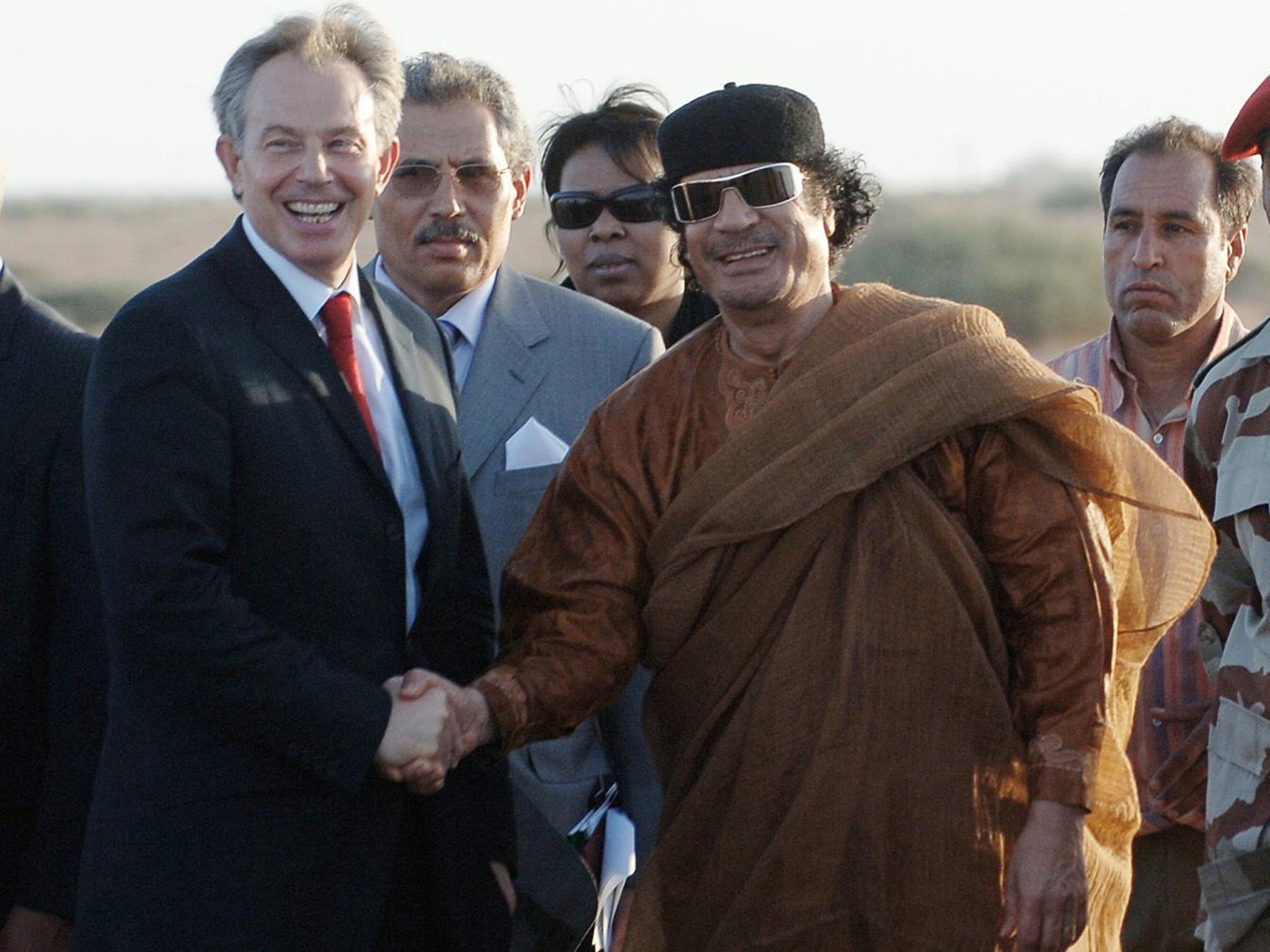Gaddafi’s warnings to Blair have been proven by today's attack on Libyan police training centre
Transcripts of two telephone calls between the leaders on February 25, 2011 reveal that the West was quick to downplay the presence of Islamic extremists in the 2011 uprising


The Libyan uprising always contained more extreme Islamists than portrayed by its supporters inside and outside Libya. There is a measure of truth in Muammar Gaddafi's claim to Tony Blair that the jihadis had "managed to set up local stations and in Benghazi have spread the thoughts and ideas of al Qaeda."
His claims sound particularly prophetic since the transcript of the Blair-Gaddafi phone conversations are published on the same day that a suicide bomber driving a truck packed with explosives killed an estimated 65 people at a Libyan police academy. The attack is likely to be the work of the Libyan branch of Isis which today controls Sirte, Gaddafi's home region and last stronghold, and has been battling over the last week to take over Libya's main oil ports.
But it is also true that protests which began in Libya on 15 February and turned into a general uprising had wide popular support among Libyans. By the time of the phone call, protesters had seized Benghazi, Misurata and many other cities and towns while part of the regular armed forces had defected to the opposition.
Gaddafi's repeated claim to Mr Blair that there was nothing happening in much of the country shows that he was either eager to downplay the swift spread of the rebellion or he did not know what was going on. The latter seems the most likely explanation, given Gaddafi's repeated invitations to Mr Blair, who was in Kuwait, to come to Tripoli and his belief that once foreign journalists arrived they would see for themselves that accounts of violence had been exaggerated. "Send reporters and politicians," the Libyan leader says. "Talk to them [protesters] directly; see what kind of people they are and their connections to AQ [Al-Qaeda]."
It would be interesting to know whom Mr Blair spoke to between the first and second conversations on the same day. But after he did so he says that "if you have a safe place to go you should go there because this will not end peacefully." Later on Mr Blair says: "I repeat the statement that people have said to me, if there is a way that he [Gaddafi] should leave he should do so now."
This may have been an attempt to panic Gaddafi into bolting the country or it may be a sign that foreign military intervention in Libya, which began on 19 March, was already considered inevitable by some. Gaddafi appears to have interpreted the message relayed by Mr Blair as a threat of foreign military action. "It seems that this will be colonisation," he replies. "I will have to arm the people and get ready for a fight."
It was NATO air support for the opposition that was decisive in determining the outcome of the war. At the time of phone calls, Gaddafi does not seem to have thought that his own rule was really under threat.
Foreign governments and media exaggerated the military capacity of the rebels and underestimated their extreme Islamic and regressive ideology. Secular supporters of rebellion were taken back when one of the first proposals of the transitional government that replaced Gaddafi was for an end to the ban on polygamy.
The Gadaffi-Blair conversations leave the impression that because it was so obviously in Gadaffi's interests to suggest that his opponents were led by Islamic extremists, that the West was too swift to dismiss the idea. It also looks as if outside powers were determined to get rid of the Libyan leader whatever happened. Since the rebels were not strong enough to do this by themselves, this meant he would be overthrown primarily by a NATO air campaign and the result would be a political vacuum and the disintegration of Libya. Gadaffi may have been wrong about the way things were happening, but he was right about the final calamitous outcome.
Join our commenting forum
Join thought-provoking conversations, follow other Independent readers and see their replies
Comments
Bookmark popover
Removed from bookmarks